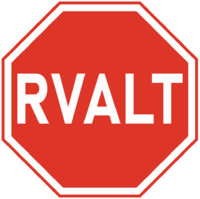rvalt: Difference between revisions
Jump to navigation
Jump to search
TheNightAvl (talk | contribs) |
TheNightAvl (talk | contribs) |
||
| (One intermediate revision by the same user not shown) | |||
| Line 1: | Line 1: | ||
== Radestrian == | == Radestrian == | ||
[[Image:RVALT.png|thumb|right|200px|A traffic stop sign in Radestrian.]] | |||
=== Etymology === | === Etymology === | ||
From {{inherit|rad|rad-m|rvalt}}, | From {{inherit|rad|rad-m|rvalt}}, | ||
| Line 16: | Line 16: | ||
=== Pronunciation === | === Pronunciation === | ||
{{rad-pr}} | {{rad-pr|<valt> (interjection)}} | ||
=== Interjection === | === Interjection === | ||
Latest revision as of 14:29, 25 August 2024
Radestrian
Etymology
From Middle Radestrian rvalt, from Old Radestrian rwaltt, inherited from Proto-Radic *rwalht, from Proto-Hirdic *swal-, from Proto-Laenkean *swal- (“to stand”). Cognate with Lusetian rull, Riyan súld and Laefevian hwalad.
Pronunciation
Interjection
rvalt
Translations
interjection
|
Verb
rvalt (first-person singular non-past rvalge, first-person singular past rvalei, present adverbial participle rvalivú, past adverbial participle rvavúl, verbal noun rvavaș)
- (intransitive, stative)
- to stand, to be standing, to be (in an upright position)
- Rvaluote ní dzíríe.
- We were standing next to each other.
- A pylles erja loráleva rvalș.
- The bottle is on the table.
- to stop, to be stopped, to be at a standstill
- Rvalș a dzians.
- The car isn't moving.
- to stand, to be standing, to be (in an upright position)
- (auxiliary) to stop, to cease [with infinitive; or with vas (+ instrumental)]
- Rvalga kad deat.
- Stop doing this.
Conjugation
| Conjugation of rvalt (active voice) | |||||||||||||
|---|---|---|---|---|---|---|---|---|---|---|---|---|---|
| nonfinite forms | |||||||||||||
| infinitive | rvalt /rvalt/ |
||||||||||||
| connegative | rvalta /ˈrvalta/ |
||||||||||||
| supine | rvaltúr /ˈrvaltuːr/ |
||||||||||||
| participle | present | adjectival | rvaliș /ˈrvaliʃ/ |
||||||||||
| adverbial | rvalivú /ˈrvalivuː/ |
||||||||||||
| past | adjectival | rvavúș /ˈrvavuːʃ/ |
|||||||||||
| adverbial | rvavúl /ˈrvavuːl/ |
||||||||||||
| verbal noun | rvavaș /ˈrvavaʃ/ |
||||||||||||
| finite forms | singular | plural | humble | ||||||||||
| first | second | third | depersonal | first | second | third | depersonal | second | |||||
| informal | formal | inclusive | exclusive | ||||||||||
| ú | re | lește | vâs, vara | gjei, gjen, gjeș … | dzun, sted | dzate | sjáște | vír, vara | gjes, gjete, gje, gjen … | sja, lai | |||
| simple | imperative | rvalga /ˈrvalɡa/ |
rvalgúș /ˈrvalɡuːʃ/ |
rvalguoș /ˈrvalɡuoʃ/ |
rvalgovú /ˈrvalɡɔvuː/ |
rvalgúr /ˈrvalɡuːr/ |
|||||||
| indicative | non-past | rvalge /ˈrvalɡɛ/ |
rvalș /rvalʃ/ |
rvalg /rvalɡ/ |
rvalguos /ˈrvalɡuos/ |
rvalguote /rvalˈɡuotɛ/ |
rvalgú /ˈrvalɡuː/ |
rvalgún /ˈrvalɡuːn/ |
|||||
| past | rvalei /ˈrvalei/ |
rvalen /ˈrvalɛn/ |
rvaleș /ˈrvalɛʃ/ |
rvale /ˈrvalɛ/ |
rvaluos /ˈrvaluos/ |
rvaluote /rvaˈluotɛ/ |
rvalú /ˈrvaluː/ |
rvalún /ˈrvaluːn/ |
|||||
| subjunctive | non-past | rvalgai /ˈrvalɡai/ |
rvalgá /ˈrvalɡaː/ |
rvalgaș /ˈrvalɡaʃ/ |
rvalga /ˈrvalɡa/ |
rvalgavuos /ˈrvalɡavuos/ |
rvalgavuote /ˈrvalɡavuotɛ/ |
rvalgavú /ˈrvalɡavuː/ |
rvalgavún /ˈrvalɡavuːn/ |
||||
| past | rvalai /ˈrvalai/ |
rvalain /ˈrvalain/ |
rvalaiș /ˈrvalaiʃ/ |
rvalai /ˈrvalai/ |
rvalavuos /ˈrvalavuos/ |
rvalavuote /ˈrvalavuotɛ/ |
rvalavú /ˈrvalavuː/ |
rvalavún /ˈrvalavuːn/ |
|||||
| optative | non-past | rvalgúe /rvalˈɡuːɛ/ |
rvalgova /ˈrvalɡɔva/ |
rvalgúș /ˈrvalɡuːʃ/ |
rvalgú /ˈrvalɡuː/ |
rvalgovuos /ˈrvalɡɔvuos/ |
rvalgovuote /ˈrvalɡɔvuotɛ/ |
rvalgovú /ˈrvalɡɔvuː/ |
rvalgovún /ˈrvalɡɔvuːn/ |
||||
| past | rvalevei /ˈrvalɛvei/ |
rvaleven /ˈrvalɛvɛn/ |
rvaleveș /ˈrvalɛvɛʃ/ |
rvaleve /ˈrvalɛvɛ/ |
rvalevuos /ˈrvalɛvuos/ |
rvalevuote /ˈrvalɛvuotɛ/ |
rvalevú /ˈrvalɛvuː/ |
rvalevún /ˈrvalɛvuːn/ |
|||||
| habitual | indicative | non-past | rvalgriè /ˈrvalɡri.ɛ/ |
rvalgrin /ˈrvalɡrin/ |
rvalgriș /ˈrvalɡriʃ/ |
rvalgri /ˈrvalɡri/ |
rvalgúris /rvalˈɡuːris/ |
rvalgúrite /rvalˈɡuːritɛ/ |
rvalgúri /rvalˈɡuːri/ |
rvalgúrin /rvalˈɡuːrin/ |
|||
| past | rvaleriè /rvaˈlɛri.ɛ/ |
rvalerin /ˈrvalɛrin/ |
rvaleriș /ˈrvalɛriʃ/ |
rvaleri /ˈrvalɛri/ |
rvalúris /rvaˈluːris/ |
rvalúrite /rvaˈluːritɛ/ |
rvalúri /rvaˈluːri/ |
rvalúrin /rvaˈluːrin/ |
|||||
| subjunctive | non-past | rvalgariè /rvalˈɡari.ɛ/ |
rvalgarin /ˈrvalɡarin/ |
rvalgariș /ˈrvalɡariʃ/ |
rvalgari /ˈrvalɡari/ |
rvalgavúris /ˈrvalɡavuːris/ |
rvalgavúrite /ˈrvalɡavuːritɛ/ |
rvalgavúri /ˈrvalɡavuːri/ |
rvalgavúrin /ˈrvalɡavuːrin/ |
||||
| past | rvalairiè /rvaˈlairi.ɛ/ |
rvalairin /rvaˈlairin/ |
rvalairiș /rvaˈlairiʃ/ |
rvalairi /rvaˈlairi/ |
rvalavúris /ˈrvalavuːris/ |
rvalavúrite /ˈrvalavuːritɛ/ |
rvalavúri /ˈrvalavuːri/ |
rvalavúrin /ˈrvalavuːrin/ |
|||||
| optative | non-past | rvalgúriè /rvalˈɡuːri.ɛ/ |
rvalgúrin /rvalˈɡuːrin/ |
rvalgúriș /rvalˈɡuːriʃ/ |
rvalgúri /rvalˈɡuːri/ |
rvalgovúris /ˈrvalɡɔvuːris/ |
rvalgovúrite /ˈrvalɡɔvuːritɛ/ |
rvalgovúri /ˈrvalɡɔvuːri/ |
rvalgovúrin /ˈrvalɡɔvuːrin/ |
||||
| past | rvaleveriè /rvaˈlɛvɛri.ɛ/ |
rvaleverin /rvaˈlɛvɛrin/ |
rvaleveriș /rvaˈlɛvɛriʃ/ |
rvaleveri /rvaˈlɛvɛri/ |
rvalevúris /ˈrvalɛvuːris/ |
rvalevúrite /ˈrvalɛvuːritɛ/ |
rvalevúri /ˈrvalɛvuːri/ |
rvalevúrin /ˈrvalɛvuːrin/ |
|||||
Derived terms
Related terms
Translations
Categories:
- Radestrian terms inherited from Middle Radestrian
- Radestrian terms inherited from Old Radestrian
- Radestrian terms inherited from Proto-Radic
- Radestrian terms inherited from Proto-Hirdic
- Radestrian terms inherited from Proto-Laenkean
- Radestrian terms derived from the Proto-Laenkean root *swal-
- Radestrian terms with Lusetian cognates
- Radestrian terms with Riyan cognates
- Radestrian terms with Laefevian cognates
- Radestrian terms with manually entered pronunciation
- Radestrian terms with multiple pronunciations
- Radestrian lemmas
- Radestrian interjections
- Radestrian terms with Laefevian translations
- Radestrian terms with translations
- Terms needing Riyan translations
- Radestrian verbs
- Radestrian intransitive verbs
- Radestrian stative verbs
- Radestrian terms with usage examples
- Radestrian auxiliary verbs
- Radestrian terms with Lusetian translations
- Radestrian terms with Riyan translations
